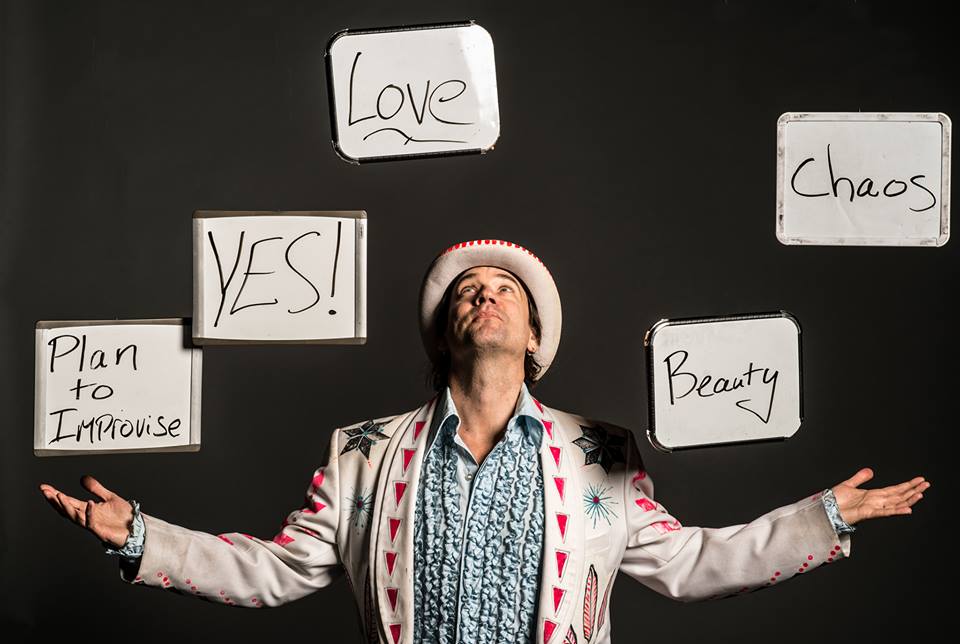
Matt Butler is a singular entity in the jamband world. His Everyone Orchestra project has brought together pretty much, well, everyone, including members from basically every imaginable band in the scene, since the revolving-door series of supergroups started in 2001. Butler is the conductor of the whole operation, leading the collectives through all-improvised setlists and guiding them to compose on-the-spot songs with hand motions, directions written on dry-erase boards, vocal cues and more, all the while bringing the crowd into the action in various interactive ways.
Butler, who arrived in the jamband scene in the early ’90s as part of the group Jambay, is also passionately committed to giving back to the community—not just his own, but also those of the world at large. Here, during a conversation aboard last month’s Jam Cruise 15, the EO conductor discusses his extensive charity work with Jam Cruise, Positive Legacy and beyond and how Everyone Orchestra is changing the way musicians interact on stage—plus a quick walk-by cameo from Twiddle frontman Mihali Savoulidis.
You’ve been on your fair share of Jam Cruises—how has the event changed over the years, from your perspective?
The only main thing that’s changed, for me, is that when I was first on, the Jam Room was set up in a hallway venue. It was a really small, kind of jazz venue, and it was all backlined. There was a sound guy, and if you had an artists’ laminate, you could get up and you had access to it. It was pretty much open. Not 24 hours a day, but from 4pm, or 3pm, on until the early morning. It wasn’t scheduled. I have this memory of walking down the hallway with Reggie Watts and running into some ALO guys and all of a sudden, two minutes later, we’re just jamming and a huge crowd comes in, and all these other musicians. Three hours later, it ends. It was completely impromptu, and the ability of really spontaneous collision between artists, that was one of my favorite things about Jam Cruise then. It doesn’t really have that now—it’s a little more planned. There’s a lot of collisions still, but it’s more planned out. Even with Everyone Orchestra, that’s kind of what I do. That’s really the only difference. I feel like it’s kind of the same. They love the artists. Cloud 9 is all about nurturing the artists’ experience and creating a fun, safe place for them to be in the sandbox of their life, which is metaphorically exactly what I do on my stages. Here, a lot of artists get to bring their spouses or their friends, and you have this really intimate thing and meet all these other musicians. They’ve cultivated a community around that. It’s really special.
Can you talk about your involvement with Positive Legacy as part of Jam Cruise?
I’m really involved and have been for a long time, and my wife was one of the founding members when they became a non-profit. It’s Cloud 9’s nonprofit that basically does outreach in the ports. Now that they do land events, you know, they do outreach in the communities where they do those events. They’re trying to have some sort of cultural interaction that goes beyond the jam tourist, and it actually gives a way for the cruisers and the musicians to give back to the communities that they’re in and bring awareness to the environmental aspects—or lack of aspects—of the cruise ship industry, or what’s going on in the communities. They’re trying to bring enlightened, awakened participation to what we’re doing. Early on, [for example,] we’d contact an orphanage in Roatán, and members of Everyone Orchestra—you know, [Jon] Fishman and Jeff Coffin and [Steve] Kimock—would all grab a box of school supplies and stuff, and we’re walking off the boat and we’d walk a half a mile to the orphanage to deliver the goods. They invite us in and we start to play a little music. It was kind of impromptu, very low-key, but it was magical. You come away from these moments going, “Wow, that’s a whole other level of what this is about, if we could actually bring something to these communities and get to know people and what’s really going on there.” That program, now, is a whole organization that has built multiple bathrooms and hospitals and schools and roofs on schools and supported after-school programs. I just feel like it does a lot of good, and it’s great to see that aspect evolve. I’ve been involved in that year after year.
[This year,] we’re supporting an after-school program at a BMX track [in Jamaica], and a hundred cruisers signed up. The executive director and some of the employees, or the people on the board at Positive Legacy, do research in Jamaica—What’s the biggest problem? Gang violence is huge. The kids go to school, and after school they don’t have anything to do. There’s very little organized activity. This program, it’s a BMX track that was founded by a nonprofit that was founded by Island Records’ founder. They helped make this nonprofit that gives kids an after-school program, a place to go, a place to learn some skills and do some stuff. So, we’re bringing in a hundred people there to help beautify the track, meet some of the kids, meet their families. Then, we’re all going to James Bond beach which is right nearby. All the kids and their families are coming, and we’re having a big feast for them and for the cruisers with live music.
That’s the format, and we’ve done it in various communities. Different aspects have changed a little bit depending on what kind of a program it is. It’s part of why I’m here. I love the music, I love Cloud 9, I love what they do, but to be involved in Positive Legacy makes me feel more attached and committed to it all.


No Comments comments associated with this post